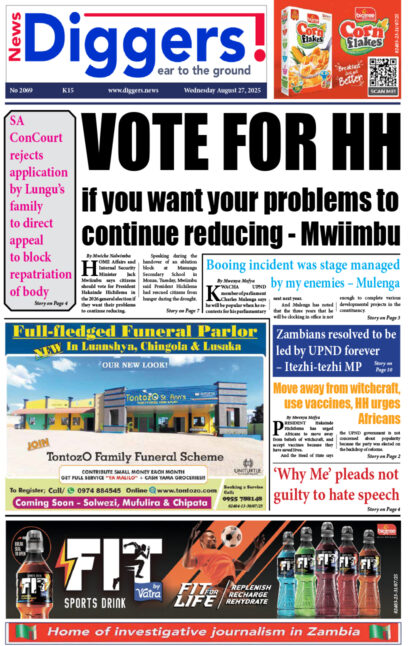Vice-President Inonge Wina says the estimated operational budget of State House for 2020 is K68.7 million.
Presenting the budget in Parliament, Thursday, Vice-President Wina said next year’s budget would help State House to dismantle arrears and facilitate efficient operations of its departments.
“Chairperson, for the information of honorable members, State House functions are performed through three key departments namely; Presidential secretariat, which is responsible for the effective and efficient execution for the Presidential day-to-day programmes. Advisory Services, which comprises of five distinct areas of specialization with a critical role of providing professional and technical back stopping to His Excellency, the President, on various divergent matters, and Administration, which is charged with the role of effective and efficient management of staff. Provision of material and logistical support services in order to facilitate the smooth operations of the institutions,” Vice-President Wina said.
“It should be further noted that estimated operations budget for State House for 2020 is K68,654,825. The budget estimates before this August House will enable State House to upgrade and facilitate efficient operations of its departments; attend to personnel emoluments; dismantling of arrears and provide maintenance of State House grounds and infrastructure; transport management and general operations. In this regard, I wish to appeal to honorable members to support the estimates of the expenditure for State House as presented.”
Vice-President Wina, however, explained that due to austerity measures, government instituted ways of reducing government’s expenditure at State House.
“State House made significant progress during the course of the year 2019 despite encountering various operational challenges. Due to austerity measures that government has instituted as a way of reducing government’s expenditure, the institution has remained focused on achieving its objectives outlined in the strategic plan within the parameters provided as we abide by the austerity requirements. It should be noted that during the year, 2019, the following programmes were undertaken: extensive staff establishment review focused on streamlining human resource capabilities and placements in order to upgrade service delivery,” Vice-President Wina explained.
“A florist was recruited and placed within State House to make flower arrangements whenever we have events and ceremonies. This has resulted in significant savings because of the reduced expenditure on purchase of already-made flower arrangements. Inspection and scrutiny of Zesco and the Lusaka Water and Sewerage Company (LWSC) equipment at State House after internal observations of high billing rates. Findings and subsequent repairs resulted in a cost saving by State House of K2,923,9443 in the second quarter of 2019.”
She also noted that lengthy tender processes hindered the timely provision of essential goods and services.
“State House continues to implement the institutions programmes for the current fiscal year. Among the key challenges faced by the institution are: rising costs of goods and services; lengthy tender processes that hinder the timely provision of essential goods and services; constant disruption of essential services due to aging infrastructure and equipment, which has resulted in the need for more resources; frequent repairs and maintenance work on the old State House building,” said Vice-President Wina.

























One Response
Dismantling arrears? Which arrears? It is not right for State House to accumulate arrears of any kind because State House is like the unit of measure in prudent management of available human and material resources. The national reference point must continue to be just that: reference point. Period. This reminds me of arrears from UNZA retirees and current staff. These odd arrears are rather obscured by incompetent and apparent intellectual deficit. The UNZA arrears need to be presented in a spread sheet, broken down manner, category by category. College by College (for instance, assistance for College of medicine could come from WHO and assistance for College of Education could come from UNESCO); Department by department (for instance, assistance for Department of Mining Engineering could come from Mining Consortium and assistance for Department of Agricultural Engineering could come from FAO); Employee grade by employee grade (Professorial grade could be treated as top priority followed by Senior Lecturers with assistance from respective sectors, with medical professors receiving help from Brazzaville regional office of WHO); line of remuneration by line of remuneration (Pension could be treated as top priority in relation to exam marking allowances with assistance from related sectors, including domestic loans); etc.